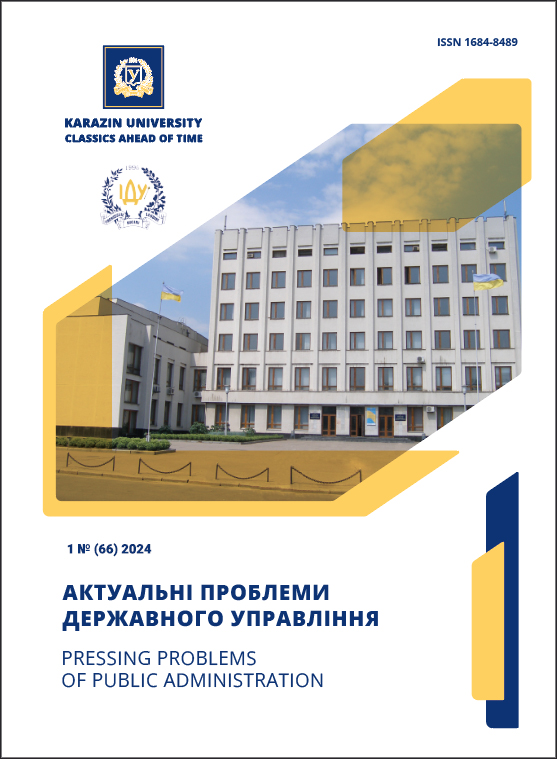Universities as agents of adaptive regional resilience: from preservation of educational and scientific schools to catalysts of territorial recovery
Abstract
The main idea of this article is the conceptualization of a new role for universities that, through the preservation of academic traditions and adaptive strategies, become key institutions for restoring regional social capital. Accordingly, the article conceptualizes the new role of Ukrainian universities as agents of adaptive regional resilience under martial law conditions. The phenomenon of regional identity preservation by universities during forced displacement and digital transformation is examined through the lens of neo-institutional theory and concepts of complex adaptive systems. The vision of “adaptive regional resilience” is described, synthesizing educational institutions’ capacity to simultaneously preserve academic identity, maintain community connections, and generate innovations. Four mechanisms of identity preservation are identified: structural-institutional (“institutional translocation”), social-network (“distributed institutional presence”), cultural-symbolic (digital practices of tradition preservation), and innovation-adaptive (“crisis innovativeness”). The specificity of Kharkiv scientific schools and the scale of losses are analyzed. Three strategies for preserving scientific schools in the post-war period are proposed: “virtual collegia” (digital reincarnation of traditions through academic genealogies and mental laboratories), combination of R&D hubs with dual education and veteran requalification, and Web 3.0 validator functions (blockchain certification of competencies and scientific DAOs). It is demonstrated that Ukrainian universities exhibit the phenomenon of “dual functioning” - the ability to simultaneously preserve traditional functions and generate innovations. Five critical assumptions for strategy implementation are formulated: technological readiness, regulatory environment, financial sustainability, human capital, and geopolitical stabilization. The potential for forming the “Kharkiv phenomenon” as a new model of post-war academia recovery through integration of therapeutic functions with technological innovations is identified.
Downloads
References
State Scientific Institution «Institute of Educational Analytics». (2023). Statistics of higher education institutions of Ukraine. Data as of early 2023. URL: https://eurydice.eacea.ec.europa.eu/national-education-systems/ukraine/higher-education [in Ukrainian]
Ministry of Finance of Ukraine. (2024). Education expenditures in Ukraine. Official statistical data. URL: https://mof.gov.ua/uk/the-reform-of-education [in Ukrainian]
On the establishment of the Council of Rectors of higher educational institutions temporarily displaced from the anti-terrorist operation zone: Order of the Ministry of Education and Science dated January 26, 2016 No. 50. (2016). Retrieved May 20, 2025, from https://zakon.rada.gov.ua/rada/show/v0050729-16#Text [in Ukrainian]
In 2024, 58% of schools operate in-person and 22% in blended format. (2024). Skilky-skilky.info. URL: https://skilky-skilky.info/u-2024-rotsi-58-shkil-pratsiuiut-ochno-ta-22-zmishano/ [in Ukrainian]
Alawadhi, H. (2024). The effects of war on the quality of higher education in Yemen: Scholars’ perspectives. International Journal of Educational Development, 108(C). DOI: https://doi.org/10.1016/j.ijedudev.2024.103058
Carmichael, T., & Hadzikadic, M. (2019). The fundamentals of complex adaptive systems. Complex Adaptive Systems, 2-16. DOI: https://doi.org/10.1007/978-3-030-20309-2_1
DAAD. (2024). Ukraine digital: Ensuring academic success in times of crisis – Funding programme 2022-2024. German Academic Exchange Service. URL: https://surl.li/vzusid
European Commission. (2023). Higher education in Ukraine. Eurydice – European Education Information Network. URL: https://eurydice.eacea.ec.europa.eu/national-education-systems/ukraine/higher-education
Ministry of Education and Science of Ukraine. (2022). Education: Impact of the War in Ukraine (May 2022). World Bank Report. URL: https://reliefweb.int/report/ukraine/education-impact-war-ukraine-may-2022
Milton, S. (2019). Syrian higher education during conflict: Survival, protection, and regime security. International Journal of Educational Development, 64, 38–47. DOI: https://doi.org/10.1016/j.ijedudev.2018.11.003
Muthanna, A., & Sang, G. (2023). A conceptual model of the factors affecting education policy implementation. Education Sciences, 13(3), Article 260. DOI: https://doi.org/10.3390/educsci13030260
OECD. (2023). PISA 2022 Results (Volume I and II) - Country Notes: Ukrainian regions (18 of 27). OECD Publishing. URL: https://www.oecd.org/en/publications/pisa-2022-results-volume-i-and-ii-country-notes_ed6fbcc5-en/ukrainian-regions-18-of-27_78043794-en.html
OECD. (2023, December 5). Programme for International Student Assessment (PISA) results in 18 regions of Ukraine in 2022, by category (in points). Statista. URL: https://surl.li/aayjwy
Scholars at Risk Europe. (2025). MSCA4Ukraine Fellowship Awards - Support for displaced researchers from Ukraine. URL: https://sareurope.eu/msca4ukraine/fellowship-awards/
Ukrainian Universities Responding to War: Displacement and Resilience. (2024). Refugee Educational Advancement Lab (REAL). URL: https://surl.lu/dsffol
UNESCO. (2023). Global education monitoring report, 2023: technology in education: a tool on whose terms? UNESCO. URL: https://unesdoc.unesco.org/ark:/48223/pf0000385723
UNESCO. (2023). Transforming Higher Education in Emergencies From Commitment to Action: Joint statement (ED/E30/EME/2023/10). UNESCO. URL: https://unesdoc.unesco.org/ark:/48223/pf0000388128
Copyright (c) 2025 Pressing Problems of Public Administration

This work is licensed under a Creative Commons Attribution 4.0 International License.

